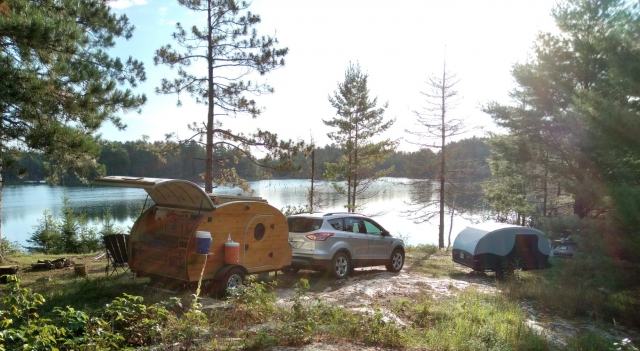Three years ago Ron Dickey posted a poll here about trailer security. I found the responses very interesting. I've hit a dead end for insurance for my homemade trailer, so, with technology improving quickly and options for trackers growing I'm wondering what direction folks are going in terms of installing trackers on their teardrops. I'm new to this tracker world, so, I hope to get some idea what works for you and what doesn't. The GPS tracker I found, and have yet to purchase, is about 50 bucks shipped and $15/month (with discounts per month if you sign on for 12 mths). I can cancel and re-up the subscription with a $25 fee. Sounds reasonable to me. It uses 3G and 4g cell signals to communicate only when the tracker is moved. I'm aware of dead zones. Hell, I'm surrounded by them in N. Wisconsin and the UP. Eventually, even in dead zones, as this one can easily be hard wired into 12v systems it will be able to communicate indefinitely.
I don't live in a high crime area. I just like the idea in case I go for a hike somewhere and come back to no trailer. Then there is the chance someone just destroys the teardrop...
Tracker Units and Their Pros and Cons
17 posts
• Page 1 of 2 • 1, 2
Tracker Units and Their Pros and Cons
Last edited by TimC on Fri Aug 16, 2019 3:58 pm, edited 1 time in total.
Tim
Niagara, WI
My First Benroy Teardrop Build Thread - A 5x8 Woodie - http://www.tnttt.com/viewtopic.php?f=50&t=63575
My Second Teardrop (partial) Build Thread - Started August '16 - http://www.tnttt.com/viewtopic.php?f=50&t=66939
#3 My son's Benroy Foamie team build - Started July '20 - http://www.tnttt.com/viewtopic.php?f=50&t=72877

Niagara, WI
My First Benroy Teardrop Build Thread - A 5x8 Woodie - http://www.tnttt.com/viewtopic.php?f=50&t=63575
My Second Teardrop (partial) Build Thread - Started August '16 - http://www.tnttt.com/viewtopic.php?f=50&t=66939
#3 My son's Benroy Foamie team build - Started July '20 - http://www.tnttt.com/viewtopic.php?f=50&t=72877
-

TimC - Gold Donating Member
- Posts: 1439
- Images: 751
- Joined: Sat May 23, 2015 4:15 am
- Location: WI/MI border
Re: Tracker Units and Their Pros and Cons
While I agree with your thoughts in premise, I have mixed feelings about investing in one.
You see, while we have the technology to install a unit, and even track it in real time, we have the huge stumbling block that law enforcement doesn't invest much, if any energy in the pursuit of finding your property. Apparently, it "costs too much in money and manpower" to actually enforce all the laws that they promised to enforce, thus "property crimes' get shoved onto a back burner, if not right off the stove.
It hardly benefits one to invest in the tech, if one can't rely on law enforcement to retrieve your property and arrest the thief. At best, you would have to track down your property, then notify the authorities, and hope they respond. You are not at liberty to take action on your own, as then you are the lawbreaker.
I'll stop now, as my comments are sliding toward a political leaning.
Roger
You see, while we have the technology to install a unit, and even track it in real time, we have the huge stumbling block that law enforcement doesn't invest much, if any energy in the pursuit of finding your property. Apparently, it "costs too much in money and manpower" to actually enforce all the laws that they promised to enforce, thus "property crimes' get shoved onto a back burner, if not right off the stove.
It hardly benefits one to invest in the tech, if one can't rely on law enforcement to retrieve your property and arrest the thief. At best, you would have to track down your property, then notify the authorities, and hope they respond. You are not at liberty to take action on your own, as then you are the lawbreaker.
I'll stop now, as my comments are sliding toward a political leaning.
Roger
- GTS225
- The 300 Club
- Posts: 316
- Joined: Wed Aug 29, 2018 2:11 am
- Location: Waterloo, Iowa

 ).
). )
)




